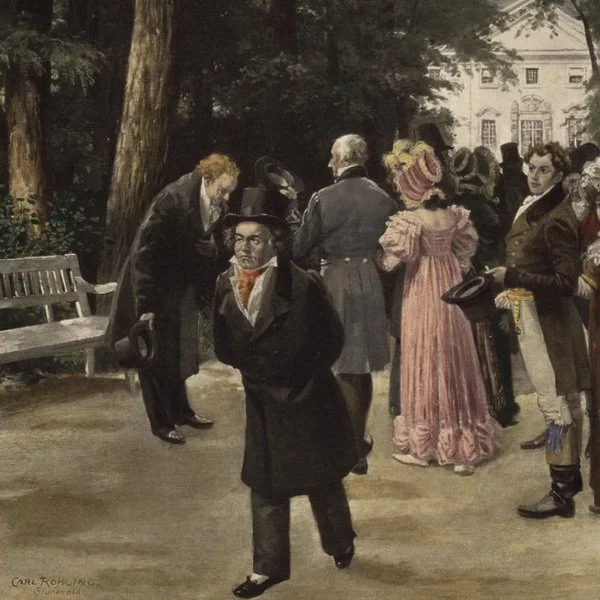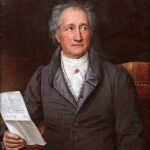After much organization by Bettina von Arnim, who was a great admirer of both Goethe and Beethoven, the two finally met in Teplitz (or Töplitz), in the summer of 1812.
Johann Wolfgang von Goethe (28 August 1749 – 22 March 1832) was the greatest, and probably also the most influential German-language writer. Not only that, but a significant scientist, theatre director, thinker and philosopher.
Bettina von Arnim, who had a soft spot for older genius gentlemen, knew both and long wished them to meet. It finally happened when they stayed in Teplitz for a summer holiday.
They had spent almost the whole week together, meeting every day for a walk and long discussions. Beethoven played for Goethe and asked him for an opera libretto. Something he promised, but finally never delivered.
One day during their walk they encountered the empress and some archdukes. Goethe, being a proud court official at Weimar, knew his place and how to behave properly in these circles and situations. Beethoven, brought up in the spirit of the French Revolution, on the other hand never tolerated such birth-rights or social hierarchies. This he made clear to Goethe, also encouraged him to have pride and self-esteem. As the nobility approached, Goethe withdrew his arm from Beethoven in order to step aside, took his hat off and bowed.
The composer watched the act stunned! He, instead, pressed down his hat more firmly, crossed his arms behind his back, and pushed through the crowd. Beethoven later wrote to Bettina about the incident saying, “princes and courtiers formed a lane for me; Archduke Rudolph took off his hat, and the Empress bowed to me first. These great ones of the earth know me.” Once they all had left, he waited for Goethe and said, “Well, I’ve waited for you because I honor and respect you as you deserve, but you did those yonder too much honor.”
Later Beethoven expressed his disappointment (again) to Goethe and this did not help their friendship at all. The composer had his opinion aired to Gottfried Härtel, writing “Goethe delights far too much in the court atmosphere, far more than is becoming to a poet.”
This incident was eternalized in 1882 by Carl Röhling, in the painting called The Incident at Teplitz.














